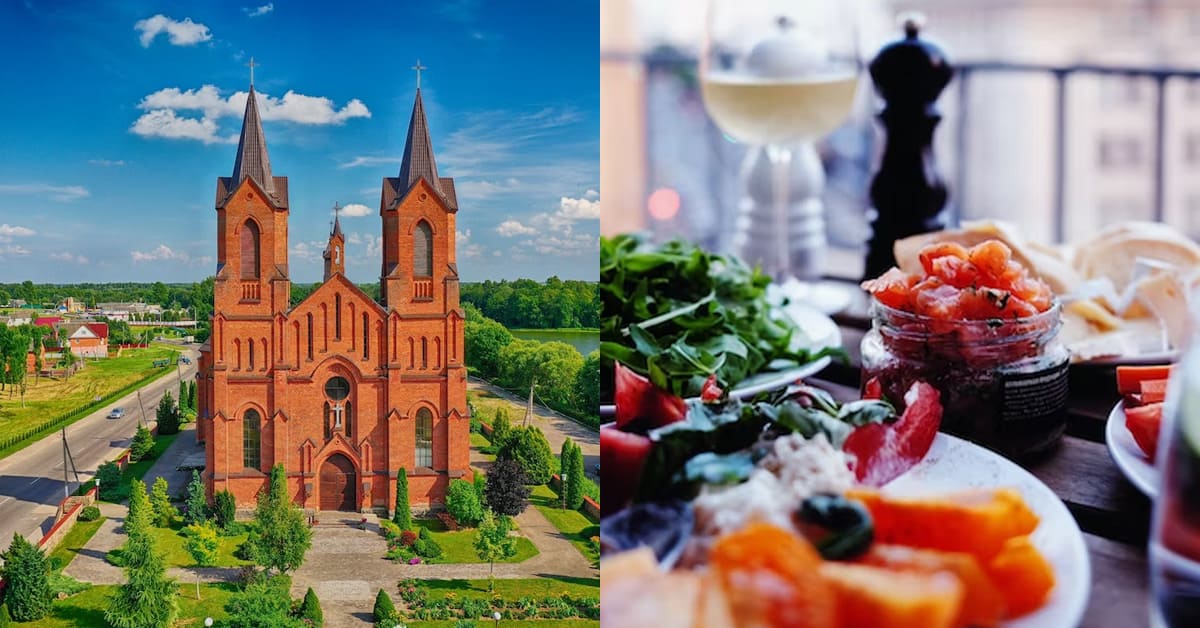Belarusian cuisine is a unique blend of traditional Slavic dishes with influences from neighboring countries such as Russia, Poland, and Lithuania. The cuisine is known for its hearty and filling dishes, often made with simple ingredients such as potatoes, meat, and dairy products.
Belarusian food is also characterized by its use of preserved foods, such as pickled vegetables and salted fish, which were historically necessary for survival during long winters. Despite being relatively unknown outside of Belarus, the country’s cuisine is gaining popularity among food enthusiasts for its rich flavors and cultural significance.
Is Belarusian food halal?
Belarusian cuisine is not inherently halal, as it includes dishes that contain pork and alcohol.
However, there are some dishes that can be made halal by substituting certain ingredients.
It is recommended to check with the restaurant or cook to ensure that the food is prepared according to halal standards.
What kind of food do Belarusian eat?
Belarusian cuisine is heavily influenced by the country’s agricultural and peasant roots. Some popular dishes include:
- Draniki – potato pancakes served with sour cream or mushroom sauce
- Kalduny – meat-filled dumplings
- Machanka – a pork stew served with potatoes and sour cream
- Kletski – potato dumplings served with bacon and onions
- Solyanka – a sour soup made with meat, vegetables, and pickles
- Zharkoye – a meat and vegetable stew
- Kholodnik – a cold soup made with beets, cucumbers, and sour cream
- Bliny – thin pancakes served with various fillings such as cheese, mushrooms, or meat.
Belarusians also enjoy bread, dairy products, and pickled vegetables as part of their daily diet. Meat, especially pork, is a staple in many dishes.
How can you tell if the food is halal in Belarus?
In general, to determine if food is halal in Belarus, you can look for halal certification labels or ask the restaurant or food supplier if they have halal certification.
You can also check with local Muslim organizations or mosques for recommendations on halal food options in the area.
Is it hard to find halal food in Belarus?
According to the information available online, it may be challenging to find halal food in Belarus.
The majority of the population in Belarus is Orthodox Christian, and there are not many Muslims living in the country.
Therefore, there are not many halal restaurants or food options available.
However, some supermarkets and restaurants in larger cities like Minsk may offer halal food. It is recommended to do research and ask locals for recommendations before traveling to Belarus.
Is Belarusian food healthy?
Belarusian cuisine is known for its hearty and filling dishes, often featuring meat, potatoes, and dairy products.
While some traditional dishes may be high in calories and fat, there are also many healthy options available, such as vegetable soups, salads, and grilled fish.
As with any cuisine, it is important to balance indulgent dishes with healthier options to maintain a balanced diet.
What is Belarusian food similar to?
Belarusian food is similar to other Eastern European cuisines, such as Russian, Ukrainian, and Polish.
It features hearty dishes made with potatoes, meat, and dairy products, as well as pickled vegetables and bread.
Some popular Belarusian dishes include draniki (potato pancakes), machanka (pork stew), and kholodnik (cold beet soup).
Steps to find halal food in Belarus
Here are some general steps that can be taken to find halal food in any country:
- Research online: Look for halal restaurants or grocery stores in Belarus through online search engines or social media platforms.
- Ask locals: Ask locals or fellow Muslims in Belarus for recommendations on where to find halal food.
- Check for halal certification: Look for halal certification logos or signs in restaurants or grocery stores. These certifications ensure that the food is prepared according to Islamic dietary laws.
- Contact local Islamic organizations: Contact local Islamic organizations or mosques in Belarus for information on halal food options.
- Bring your own food: If halal food is not readily available, consider bringing your own food or snacks that are halal-certified.
- Be cautious: Always double-check the ingredients and preparation methods of the food before consuming it to ensure that it is halal.

